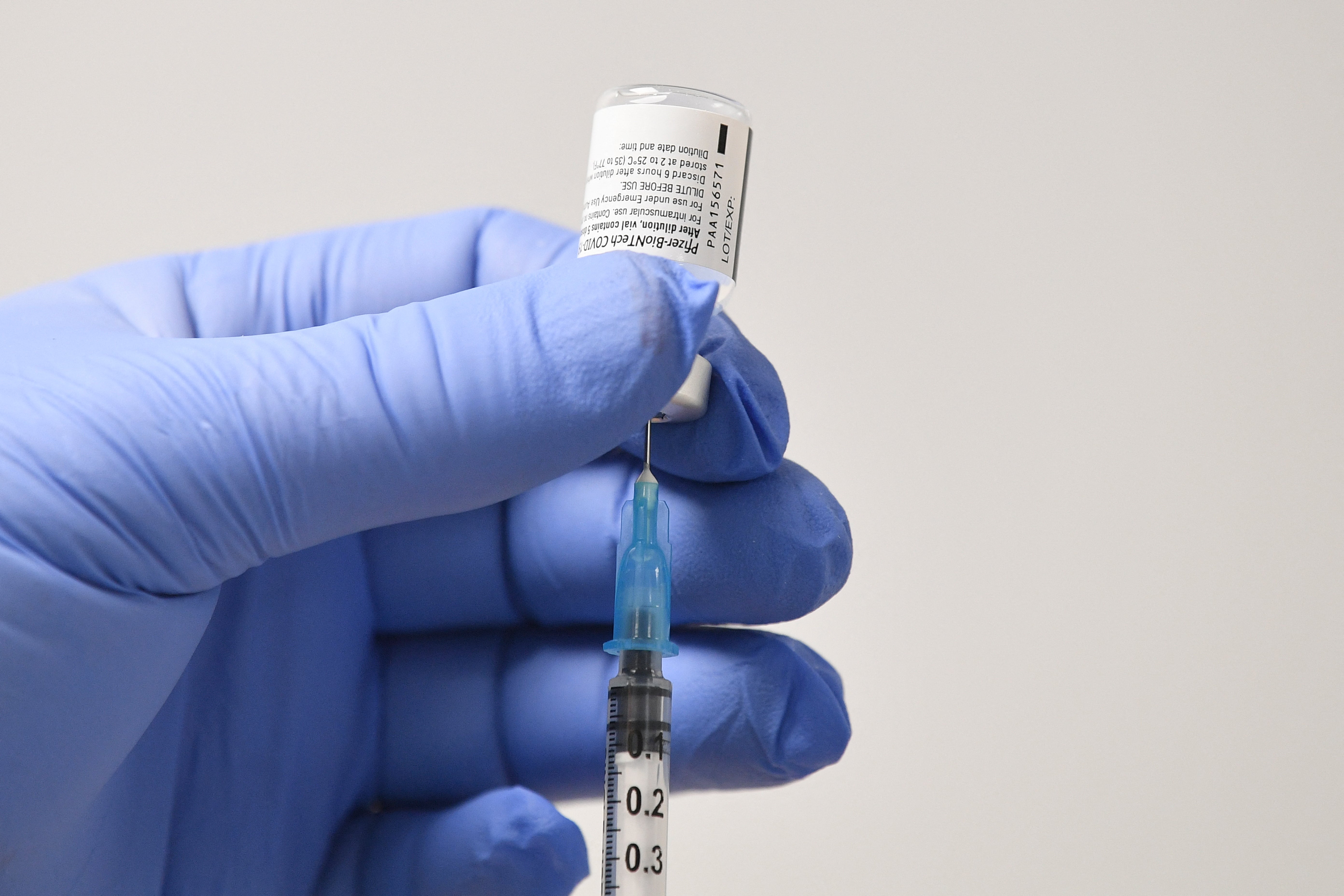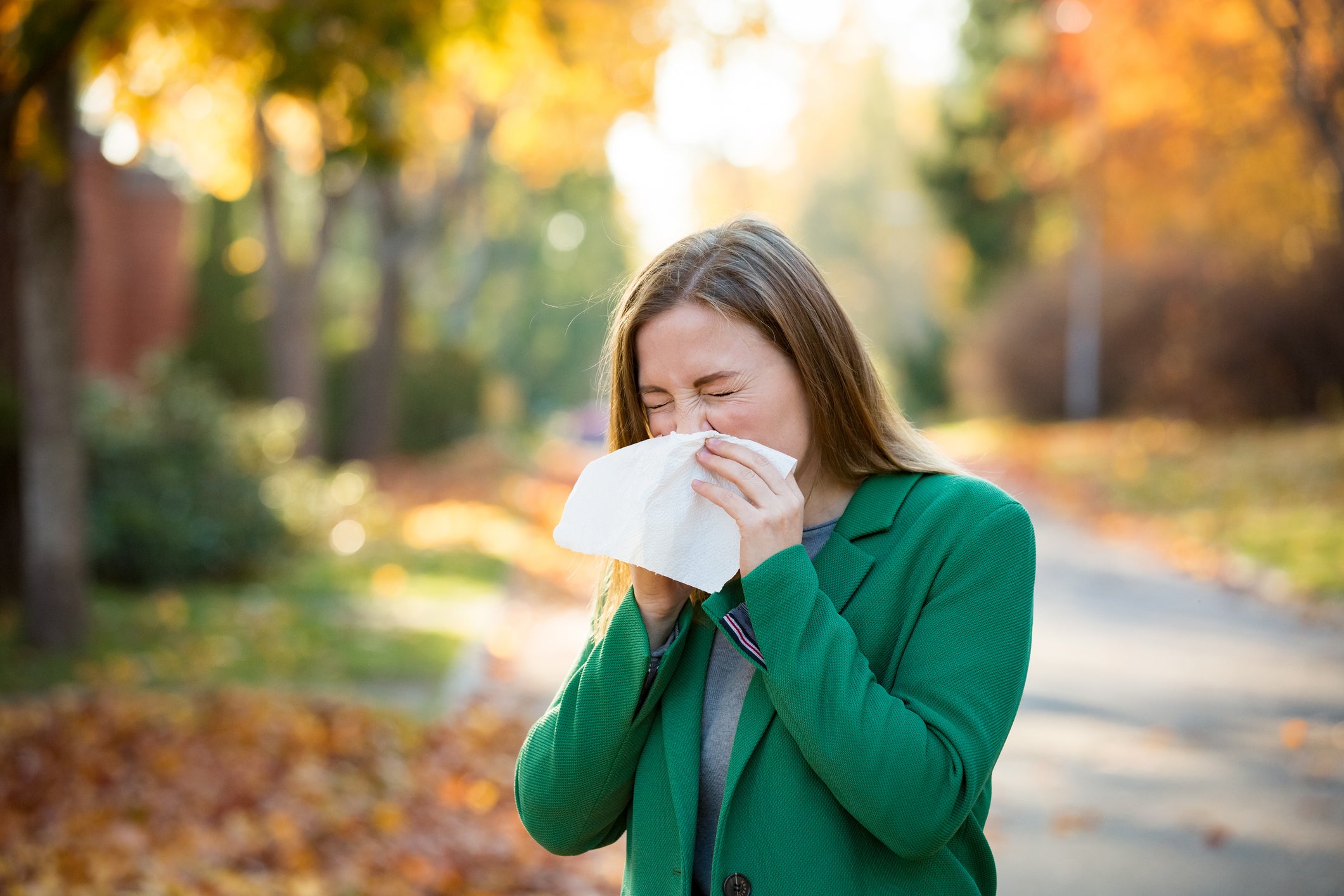

HEALTH
Watch for These Early Signs of Womb Cancer—They Could Save Your Life!
Published
3 weeks agoon
By
OBS
Cases of womb cancer have risen by 50 per cent over the past 20 years, but many women do not know the warning signs.
The disease, which is also sometimes called endometrial or uterine cancer, is found in the lining of the womb – the muscular bag that would hold a baby during pregnancy.
Actress and Strictly Come Dancing star Alex Kingston, 62, has revealed her struggle with womb cancer in an interview with The Independent.
Womb cancer is the fourth most common cancer in women in the UK, behind breast, lung and bowel cancer, and it affects 9,700 people a year, according to the charity, The Eve Appeal.
But what causes womb cancer, and what early signs should you be aware of?

What is womb cancer?
“Womb cancer is a type of cancer that starts in the uterus (womb),” says Ms Sangeeta Khinder, consultant obstetrician and gynaecologist at London Gynaecology. “The most common type [of womb cancer] is endometrial cancer, which begins in the lining of the womb.”
A less common, but more aggressive, type of womb cancer is called uterine sarcoma.
“This type develops in the muscle of the womb,” she says.
What are the causes of womb cancer?
“Endometrial cancer develops when the cells in the lining of the uterus (endometrium) grow uncontrollably, often due to hormonal imbalances,” explains Ms Khinder. “High levels of oestrogen, especially when unopposed by progesterone, can cause excessive thickening of the endometrium, increasing the risk of cancerous changes.
“Several factors contribute to this imbalance, including obesity, polycystic ovary syndrome (PCOS), and oestrogen-only hormone replacement therapy (HRT).”
The gynaecologist adds that conditions such as diabetes and a family history of uterine or colorectal cancer can also increase this risk.

What are the early symptoms of womb cancer?
The main symptom of womb cancer is abnormal vaginal bleeding, according to The Eve Appeal. This includes any unexpected bleeding, particularly after menopause or between periods.
“If there is any bleeding between periods or if the periods are prolonged or heavier, this needs to be taken seriously and investigated,” says Ms Khinder.
Abnormal vaginal discharge, especially during menopause, should also be flagged to a doctor, adds Ms Khinder.
Vaginal discharge that is blood-stained or appears pink or brown could also be a warning sign of cancer.
It’s important to get any symptoms checked, whether or not you have had a clear cervical screening test, The Eve Appeal stresses. That’s because cervical screening only helps to prevent cervical cancer and not the other four gynaecological cancers, including the womb.

Who is most at risk of womb cancer?
Most women diagnosed with womb cancer have been through their menopause and are aged 75 to 79, according to Cancer Research.
“The lifetime risk of getting endometrial cancer is 1 in 100 and peak incidence is after menopause in 50s and 60s, hence it’s important for women in the menopause to be aware of the signs and symptoms,” says Ms Khinder. “Other risk factors such as high Body Mass Index, diabetes and Polycystic Ovary Syndrome (PCOS) also increase the risk of this type of cancer.”
How is womb cancer diagnosed?
If a patient reports symptoms of womb cancer to their GP, they will likely check the patient’s pelvic area, including between the hip bones and the lower part of the tummy, for abnormalities. They will also ask more questions about symptoms.
In some cases, patients will be referred for more tests at a hospital, such as a transvaginal ultrasound and a biopsy.
A less invasive test to diagnose womb cancer, called WID-easy, has been approved for use in the UK.
Using technology similar to that used in Covid tests, the process involves a simple swab sent to a lab for DNA analysis. The test identifies DNA changes that may indicate womb cancer, providing an alternative to traditional methods such as transvaginal ultrasounds or hysteroscopies. If the test suggests the presence of cancer, further confirmation through a biopsy is required.
The new test, by University College London (UCL) spinout company Sola Diagnostic, has been approved by the Medicines and Healthcare products Regulatory Agency (MHRA). It is now available for women over 45 with abnormal uterine bleeding in private clinics, with hopes for future availability on the NHS.

How is womb cancer treated?
The most common treatment for womb cancer is a hysterectomy, which is the surgical removal of the uterus. “A simple hysterectomy, which is often carried out as a key-hole procedure, is often the only treatment needed for early low-grade endometrial cancers,” explains Khinder. “A keyhole hysterectomy is associated with tiny incisions, a short hospital stay and quick recovery.”
Following a hysterectomy, the cancerous cells are tested further to determine if they have spread beyond the inner half of the uterine wall.
“If this is a possibility, further treatment with radiotherapy may be offered to minimise chances of cancer cells coming back,” says Ms Khinder.
If you have concerns about symptoms, tests, or a diagnosis of womb cancer, Ask Eve is available to help. You can contact the charity’s nurses by emailing nurse@eveappeal.org.uk or calling 0808 802 0019.
You may like
-


Discover How the New Apple Watch Measures Your Heart Rate with Amazing Accuracy!
-


Revolutionary Blood Test Approved by FDA for Early Alzheimer’s Detection!
-


Don’t Miss Out: How to Watch Nigeria vs. Benin Live! Channel Details, Kick-off Time & Everything You Need for the 2026 World Cup Qualifier!
-


New Driving License Requirement Could Help Save Lives – Find Out What!
-


How Uma Ukpai’s Late Inspiration Changed My Life – Nathaniel Bassey’s Touching Story
-


Watch: Freed Hostage Eitan Mor’s Emotional Reunion with Family in Israel
HEALTH
Can’t Tell If It’s Covid or the Flu? Here Are the Key Symptoms You Must Recognize as Cases Surge!
Published
2 weeks agoon
October 16, 2025By
OBS
Health officials are warning of a seasonal surge in flu and Covid-19, with cases already starting to rise as autumn arrives.
But because the two viruses share many symptoms, it’s difficult to tell them apart.
When a sniffle seems to progress further than “just a cold”, it’s hard to know what it might be – but there are differences in how the viruses appear and the risks they pose.
Do I have Covid?
Covid-19 continues to cause serious illness, particularly among vulnerable groups. The virus is constantly evolving, with new variants spreading easily through coughs, sneezes or even conversation.
Vaccination campaigns each autumn continue to try to prevent hospitalisations and deaths.
The list of symptoms has shifted since 2020. Many people now experience cold-like symptoms, such as a runny nose, sore throat or blocked sinuses. But others still report fever or chills, a persistent cough, fatigue, headaches, shortness of breath, or a loss of taste and smell. Nausea and diarrhoea can also occur.
Doctors say a hoarse throat has become one of the hallmark features of the latest variants.

The latest strain, called Stratus, has two variants, XFG and XFG.3. Another recent strain, NB.1.8.1 nicknamed Nimbus, is also prevalent.
“Stratus is linked to hoarseness and fatigue, whereas Nimbus is associated with a ‘razor-blade’ sore throat and digestive symptoms like nausea and bloating,” explains Dr Bruno Silvester Lopes, lecturer in microbiology at Teesside University. “Both are highly transmissible but not more severe than previous variants.”
Despite accounting for a large proportion of new cases, experts are not concerned about the spread, noting it is normal for viruses to mutate and change.
Those aged 65 and over, care home residents, and people with underlying health problems are all entitled to the Covid-19 booster.
Do I have the flu?
Flu is a respiratory infection that strikes hardest in winter and can be far more debilitating than the common cold. While colds typically bring a runny nose, sneezing, watery eyes and mild throat irritation, flu tends to arrive suddenly with fever, aches and exhaustion.
Last winter alone, the flu sent more than 8,000 people to hospital. Over the past two years, at least 18,000 deaths in the UK have been linked to the virus. Children, older adults, people with long-term health problems and those with weakened immune systems face the highest risks.

Vaccination remains the strongest defence. Research shows that last year’s jab prevented thousands of severe cases, cutting hospital admissions by almost a third among over-65s and by more than half among children aged two to 17.
This autumn, the flu vaccine is being offered free to those over 75, pregnant women, children aged 2 and 3 through their GP, and schoolchildren from reception to year 11 via nasal spray. Adults under 65 with certain health conditions are also eligible.
How to tell difference between Covid and a cold
Colds and Covid can be tricky to distinguish as many of their symptoms overlap.
“Both can give you a sore throat, runny or stuffy nose, sneezing, and coughing,” says Dr Chun Tang, a GP at Pall Mall Medical. “However, Covid can also cause fever, fatigue, muscle aches, and that telltale loss of taste or smell – although that’s less common with newer variants.
“Covid is also more likely to make you feel wiped out, like you’ve been hit by a truck, whereas a cold tends to stay in your head and chest.”
“Both spread mainly through droplets when someone coughs, sneezes, or even talks near you,” says Tang. “Covid, however, can also spread more easily through the air in tiny particles that linger, especially in crowded or poorly ventilated spaces.
“So, while a cold might need a bit of close contact to catch, Covid can sometimes sneak across the room if you’re unlucky.”
Are cases climbing now?
According to the UK Health Security Agency, levels of flu and Covid-19 are already on the rise running into winter, joining other seasonal bugs such as RSV and norovirus.
UKHSA reported an increase in the number of reported Covid diagnoses in its 9 October report, with the most prevalent strain noted as Stratus XFG. Flu activity was also increasing among young adults with a surge in emergency department attendances for flu-like illnesses.
Experts say the risk is highest during the colder months when viruses spread more easily indoors.
Officials are urging everyone eligible to take up their vaccines to reduce the strain on hospitals and protect the most vulnerable. Both flu and Covid-19 can be serious, but prevention and early awareness remain the best tools against them.
HEALTH
Shocking Recall: Grocery Store Taco Kits Contain Hot Chocolate Packets!
Published
2 weeks agoon
October 16, 2025By
OBS
The Giant Company is recalling its Giant and Martin’s-branded hard taco dinner kits after hot chocolate sachets were discovered inside the packages.
The mix-up, announced October 10, could pose a risk to consumers with milk allergies.
The recall affects the 9.4-ounce Giant/Martin’s Hard Taco Dinner Kit (UPC 068826757516) all lot and codes, with a best-by date of March 13, 2026.
Consumers with a milk allergy should not eat the kits. Anyone who purchased the affected product can return it to a nearby store with a receipt to receive a refund.
Milk allergy is a common food allergy in children, caused by cow’s milk or milk from other mammals, according to Mayo Clinic.
.jpg)
Reactions can occur soon after consumption and range from mild symptoms like hives, vomiting, and digestive issues to severe, life-threatening anaphylaxis.
The main treatment is avoiding milk and milk products. Most children outgrow the allergy, while others may need to avoid milk long-term.
Meanwhile, Sno Pac Foods, a Minnesota-based company, has issued a nationwide recall of its frozen spinach products due to potential contamination with Listeria monocytogenes, a bacterium that can cause serious infections.
The recall affects two products: Del Mar 35-pound Bulk Organic Frozen Spinach and Sno Pac 10-ounce Organic Frozen Cut Spinach. These products were distributed across various retail stores in the U.S. The recall was prompted after a bulk case of spinach from a supplier tested positive for the bacterium.
This same lot was used to repack the Sno Pac Organic Frozen Cut Spinach into 10-ounce bags. As a precaution, Sno Pac Foods has suspended production of these products while investigating the source of the contamination.
No illnesses have been reported in connection with the recalled products. However, Listeria monocytogenes poses a significant health risk, particularly to young children, the elderly, pregnant women, and individuals with weakened immune systems.
In healthy individuals, infection may cause short-term symptoms such as high fever, severe headache, stiffness, nausea, abdominal pain, and diarrhea. Pregnant women are especially vulnerable, as infection can lead to miscarriage or stillbirth.
HEALTH
Could Trump’s Meds Be Slowing Him Down? Expert Warns They Might Not Be Helping!
Published
2 weeks agoon
October 16, 2025By
OBS
An adviser to Health Secretary Robert F. Kennedy Jr. warned Wednesday that President Donald Trump may appear to be “slowing down” because of the medication he takes, as questions continue over the president’s mental and physical health.
In a speech to the European Parliament, Dr. Aseem Malhotra, a British cardiologist who advised the lobby group Make America Healthy Again, said that Trump, 79, may be suffering from fatigue due to his use of cholesterol medications, or statins, and aspirin.
“President Trump is taking statins; he’s on two cholesterol drugs… This man does not have any cardiovascular disease,” Malhotra said during a launch event for a new European health activism organization, Make Europe Healthy Again (MEHA).
“If you’re over 75 and have no cardiovascular disease, the benefit of statin is – are you ready? One in 446. You have to give the statin to 446 people to prevent one cardiovascular event,” he said. “In other words, no significant benefit.”
Malhotra, a vaccine skeptic whose anti-COVID shot and anti-statin views have been rebuked as misinformation by medical experts, has been a close ally to Kennedy.

His comments come amid claims that the president may be showing signs of “cognitive decline,” due to mixing up names and other gaffes. Despite the speculation, the White House said last week that Trump was in “excellent overall health” following a “routine check-up” at Walter Reed Medical Center.
In addition to concerns about his mental acuity, Trump’s physical health has also come under question. The president has often been photographed with bruising on his right hand, raising concerns that he is suffering from some illness. The White House insists that this is a result of him shaking hands with a large number of people and his use of aspirin, which he takes as a cardiovascular protection.
White House officials revealed earlier this year that he had been diagnosed with chronic venous insufficiency, a non-life-threatening condition caused by the veins struggling to return blood to the heart. The condition is common for people over the age of 70.
During his remarks, Malhotra noted that cholesterol medication often comes with side effects, saying: “The most common ones are fatigue, muscle pain. It can cause brain fog.”
He added: “Now, I know that President Trump is a remarkable man for his age, but there have been reports – probably exaggerated by some sort of devious press for sure. But I know people who are close to him… and of course he is doing a tremendous job and maybe only sleeping four hours a night, and that may be part of it too, but it could also be that he’s slowing down a little bit because of his statins,” he continued.

Malhotra then suggested that Trump go “off his statins, off his aspirin” and would be “feeling great” within a matter of weeks.
He was apparently so concerned about Trump taking the medications that he has reached out to several people close to the president to try and warn him against it, The Daily Beast reported Tuesday ahead of Malhotra’s public remarks.
In a statement to The Independent, the White House said: “President Trump is a champion-level golfer with the mental acuity and energy levels that most young people could not fathom having.”
“So-called medical ‘experts’, especially foreign ones with no relevance or involvement with the Administration, should stop beclowning themselves and marring their credibility by pitching their idiotic hot takes with Fake News outlets that have nothing better to cover,” White House spokesman Kush Desai said.

Along with Trump’s most recent gleaming health report, White House officials noted the president received a flu shot and an updated COVID-19 booster, which Malhotra called unnecessary.
“I think President Trump, I think he genuinely took the [COVID-19] booster, I don’t think that this is a front. I think he believes in what’s happening. He himself is also a victim of medical misinformation,” Malhotra said.
However, recent research shows that COVID shots protect against serious illness and death, especially for people over the age of 65. Researchers from the VA St. Louis Healthcare System looked at data from nearly 300,000 veterans and found that last season’s Covid vaccine reduced the risk of emergency room visits by 29 percent, hospitalizations by 39 percent and deaths by 64 percent for all ages, NBC News reports.
Combining all three outcomes, the shots’ overall effectiveness was 28 percent, making it similar to the flu shot, which ranges from 30 to 60 percent protective against severe illness or death.
An April health report also noted that Trump, who was the oldest person to ever take office in January at 78, was in “excellent” health.
The report also noted that Trump had high cholesterol that was being treated with the statin rosuvastatin and ezetimibe, a medication used to absorb cholesterol. He was also taking a low-dose aspirin as part of the treatment, his doctors said at the time.
While there is no evidence that statins alone cause dementia, the FDA added a safety warning to the medications in 2012 to warn of “notable, but ill-defined memory loss or impairment that was reversible upon discontinuation of statin therapy.”
Last month, Malhotra made headlines after suggesting – without evidence – that King Charles III may have gotten cancer because of the COVID-19 vaccine.
Categories
Top Tags
Related posts






















